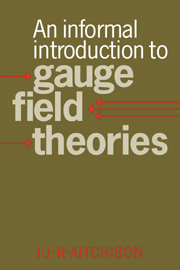Book contents
- Frontmatter
- Contents
- Preface
- Preface to the Paperback Edition
- 1 Introduction and motivations
- 2 Symmetries in quantum field theory: I Manifest
- 3 Gauge fields and the gauge principle
- 4 Quantisation of vector fields: I Massless
- 5 Quantisation of vector fields: II Massive
- 6 Symmetry in quantum field theory: II Hidden
- 7 Theory of weak and electromagnetic interactions
- 8 Renormalisation matters
- References
- Index
Preface to the Paperback Edition
Published online by Cambridge University Press: 20 January 2010
- Frontmatter
- Contents
- Preface
- Preface to the Paperback Edition
- 1 Introduction and motivations
- 2 Symmetries in quantum field theory: I Manifest
- 3 Gauge fields and the gauge principle
- 4 Quantisation of vector fields: I Massless
- 5 Quantisation of vector fields: II Massive
- 6 Symmetry in quantum field theory: II Hidden
- 7 Theory of weak and electromagnetic interactions
- 8 Renormalisation matters
- References
- Index
Summary
The first printing of this book in 1982 was followed by a reprint with corrections, which is the text reissued here. During the intervening year, 1983, the discoveries of the W± and Z0 were announced, as recorded in footnotes on pages 4 and 110. The discovery of the top quark came twelve years later, completing the third family. Of the particles expected in 1984, only the Higgs boson has so far eluded detection. Despite this notable absentee, there is – remarkably – still no conclusive quantitative discrepancy between experiment and the predictions of the Standard Model of particle physics, based on the gauge group SU(3) × SU(2) × U(l) and a single Higgs doublet, as outlined here.
The opportunity has been taken here to make some further corrections for the paperback reissue. I am extremely grateful to Dr. George Emmons for essential help with this.
Information
- Type
- Chapter
- Information
- An Informal Introduction to Gauge Field Theories , pp. ix - xPublisher: Cambridge University PressPrint publication year: 1982
Accessibility standard: Unknown
Why this information is here
This section outlines the accessibility features of this content - including support for screen readers, full keyboard navigation and high-contrast display options. This may not be relevant for you.Accessibility Information
- 1
- Cited by
